Charting New Relationships: Black History and Anti-racism in Canada
Charting New Relationships: Black History and Anti-racism in Canada
Indigenous Peoples, Black Peoples, and Peoples of Colour have a shared history of racism, of exclusion and marginalization, in Canada and in other nations. It is important to recognize the multi-faceted nature of racism in our land. While Indigenous Peoples, Black Peoples, and Peoples of Colour have and continue to experience racism that is similar in many ways, in many other ways the racism experienced by Indigenous peoples in Canada is unique. Colonialism, the Indian Act, and the residential school system, for example, have created a “dual track” of racism that is distinct among First Nations,Métis, and Inuit people.
Education for Sustainable Development
Education for Sustainable Development
Education for Sustainable Development involves incorporating key themes of sustainable development – such as poverty alleviation, human rights, health and environmental protection, climate change – into the education system. ESD is a complex and evolving concept and requires learning about key themes from a social, cultural, environmental and economic perspective and explores how those factors are inter-related and inter-dependent. The Venn diagram below represents the inter-relationship of the themes.
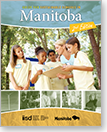 Guide for Sustainable Schools in Manitoba
Guide for Sustainable Schools in Manitoba
Education for Sustainable Development (ESD) entails a reorienting of education to guide and motivate people to become responsible citizens of the planet. It addresses the interrelationships among the environment, the economy, and society: “ESD aims to help people to develop the attitudes, skills, perspectives and knowledge to make informed decisions and act upon them for the benefit of themselves and others, now and in the future” (UNESCO, n.d.). ESD moves from students learning about sustainable development to students experiencing how to live sustainably.
Incorporating Indigenous Perspectives
Incorporating Indigenous Perspectives: A Themed-Based Curricular Approach
To support the incorporation of Indigenous Perspectives, the Indigenous Education Directorate, through Indigenous Education has established goals that are based on the premise that school environments inclusive of Indigenous knowledge and perspectives will improve student success and completion rates, increase employability skills and reduce transiency.
Historical Thinking Project
Historical Thinking Project
The Historical Thinking Project was designed to foster a new approach to history education — with the potential to shift how teachers teach and how students learn, in line with recent international research on history learning.
Residential Schools
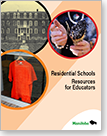 Residential Schools: Resources for Educators
Residential Schools: Resources for Educators
As a society, we must recognize the tragic legacy of residential schools and colonialism. Beyond recognition, however, education has an important role in raising awareness of the impact of residential schools. It is incumbent upon Canadians to learn from the past and respond to the Calls to Action of the Truth and Reconciliation Commission of Canada in order to promote healing and reconciliation.
Social Studies Field-Based Experience Guidebook
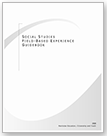 Social Studies Field-Based Experience Guidebook
Social Studies Field-Based Experience Guidebook
Social Studies Field-Based Experience Guidebook has been prepared to support the implementation of the new Manitoba Kindergarten to Grade 12 social studies curriculum. It provides examples of field-based experiences for various grades, and lists relevant specific learning outcomes (SLOs) for each activity. Skills outcomes are not specified for the activities, as it is left to the teacher’s discretion to decide which skills to focus on during each field-based experience.
Grade 12 Current Topics in First Nations, Métis, and Inuit Studies
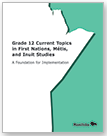 Grade 12 Current Topics in First Nations, Métis, and Inuit Studies - Foundation for Implementation
Grade 12 Current Topics in First Nations, Métis, and Inuit Studies - Foundation for Implementation
Bibliography—Grade 12 Current Topics in First Nations, Métis, and Inuit Studies ( 161 KB)
161 KB)
Grade 12 Current Topics in First Nations, Métis, and Inuit Studies: A Foundation for Implementation supports the empowerment of students through the exploration of the histories, traditions, cultures, worldviews, and contemporary issues of Indigenous peoples in Canada and worldwide.
Grade 12 World Geography
Grade 12 World Geography - Overview ( 22 KB)
22 KB)
The Senior 4 World Geography curriculum deals with locations, patterns, distribution, and interrelationships between the physical and human environments in a constantly changing world.
Grade 12 Global Issues
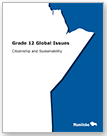 Grade 12 Global Issues: Citizenship and Sustainability
Grade 12 Global Issues: Citizenship and Sustainability
Social studies examines human societies and the complex interactions among human beings living together in a shared world. This course provides a lens of ecological literacy through which students can study and understand the complex and often critical global issues that societies face today
Grade 12 Cinema as a Witness to Modern History
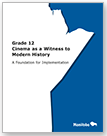 Grade 12 Cinema as a Witness to Modern History: A Foundation for Implementation
Grade 12 Cinema as a Witness to Modern History: A Foundation for Implementation
Grade 12 Cinema as a Witness to Modern History - Bibliography ( 160 KB)
160 KB)
This course will engage students in an exploration of the connections among cinema as an art form, cinema as a product of history, and cinema as an interpreter of history. Students will respond to and discuss the aesthetic and emotional elements of cinema and will apply historical thinking concepts to the analysis of historical themes as represented in various films and other sources.
Grade 12 Western Civilization
Grade 12 Western Civilization - Course Outline ( 20 KB)
20 KB)
The Senior 4 Western Civilization curriculum is designed to help students understand that Canadian society and other Western societies evolved and were shaped by complex movements and events.
Grade 12 Canadian Law
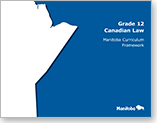 Grade 12 Canadian Law (40S): Manitoba Curriculum Framework
Grade 12 Canadian Law (40S): Manitoba Curriculum Framework
The Grade 12 Canadian Law curriculum presents students with the major components of Canadian law, beginning with the foundations of law, followed by the Canadian Charter of Rights and Freedoms, criminal law, civil law, and family law.